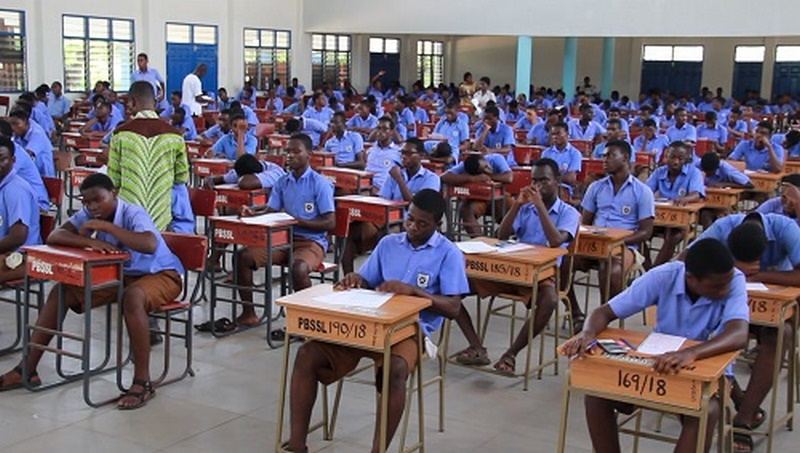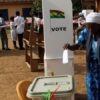Here are 50 objective questions on elections that can be suitable for senior high school (SHS) students:
1. Which of the following is the primary purpose of elections?
a) To generate revenue
b) To select leaders
c) To control inflation
d) To allocate resources
2. What type of democracy involves citizens electing representatives to make decisions on their behalf?
a) Direct democracy
b) Representative democracy
c) Monarchy
d) Autocracy
3. Which of the following systems of voting is used in presidential elections in most countries?
a) Plurality system
b) Proportional representation
c) Single transferable vote
d) Runoff voting
4. The right to vote in elections is referred to as:
a) Sufferance
b) Suffrage
c) Immunity
d) Liberty
5. What is an election manifesto?
a) A set of promises made by candidates
b) A law governing elections
c) A vote-counting machine
d) A political ideology
6. Which of these is NOT a requirement for voting in most countries?
a) Citizenship
b) Age qualification
c) Ownership of property
d) Voter registration
7. Which of the following is the body responsible for organizing elections in many countries?
a) Supreme Court
b) Electoral Commission
c) Parliament
d) Ministry of Justice
8. What is the term for the process of redrawing electoral district boundaries to favor one political party?
a) Gerrymandering
b) Delimitation
c) Decentralization
d) Referendum
9. What is the minimum voting age in most democratic countries?
a) 16 years
b) 18 years
c) 21 years
d) 25 years
10. Which of the following is an advantage of electronic voting?
a) It’s faster
b) It eliminates voter fraud completely
c) It requires no electricity
d) It’s cheaper than manual voting
11. In a two-party system, elections are typically contested between:
a) Many political parties
b) Two major political parties
c) Independent candidates only
d) Monarchs and commoners
12. What is a “by-election”?
a) A general election held after a referendum
b) An election held to fill a vacant seat between general elections
c) A national election for president
d) An election held only for referendum issues
13. What does “incumbent” mean in elections?
a) A candidate who is challenging the ruling party
b) The current officeholder
c) A neutral observer of the election
d) A political outsider
14. A “referendum” is best described as:
a) An election held by political parties
b) A direct vote by citizens on a specific issue
c) The same as a general election
d) A secret ballot for presidential elections
15. Which of the following is a feature of free and fair elections?
a) No opposition parties
b) Transparent vote counting
c) Restricted media coverage
d) Voter intimidation
16. What type of election system allows voters to rank candidates in order of preference?
a) Proportional representation
b) First-past-the-post
c) Runoff voting
d) Single transferable vote
17. What is the significance of a “secret ballot” in elections?
a) Voters must reveal their choice publicly
b) Voting is done anonymously
c) The government controls the vote
d) Political parties disclose results early
18. Which term describes the manipulation of votes to favor a specific candidate or party?
a) Ballot stuffing
b) Ballot rotation
c) Electoral malfeasance
d) Disenfranchisement
19. Voter turnout refers to:
a) The number of candidates running in an election
b) The percentage of eligible voters who participate in an election
c) The amount of money spent on elections
d) The percentage of invalid votes
20. The first-past-the-post voting system is also known as:
a) Majoritarian system
b) Plurality voting
c) Absolute majority
d) Preferential voting
21. What is “voter apathy”?
a) Enthusiastic participation in elections
b) A low voter turnout due to lack of interest
c) Illegal voting by ineligible voters
d) A method of vote counting
22. Which of the following is NOT a form of electoral fraud?
a) Ballot tampering
b) Voter intimidation
c) Gerrymandering
d) Free media coverage
23. The term for removing the right to vote from an individual or group is:
a) Disfranchisement
b) Enfranchisement
c) Endorsement
d) Arbitration
24. Which of the following elections is typically held every four to five years in most democratic nations?
a) Presidential elections
b) General elections
c) By-elections
d) Referendums
25. The counting of votes after an election is referred to as:
a) Balloting
b) Polling
c) Tallying
d) Nominating
26. What does “universal suffrage” mean?
a) Only men can vote
b) Only citizens above 40 years can vote
c) All adult citizens have the right to vote
d) Only tax-paying citizens can vote
27. Which of the following is a factor that can influence election outcomes?
a) Media coverage
b) Campaign funding
c) Voter perception
d) All of the above
28. What is the term for the number of votes a candidate receives in an election?
a) Polling
b) Ballot
c) Tally
d) Vote count
29. A political party is defined as:
a) A government institution
b) A group of people with similar political views
c) A law-making body
d) A branch of the military
30. In elections, what is a “runoff”?
a) An election held to determine a winner if no candidate gets a majority
b) The process of counting votes
c) A celebration after elections
d) A procedure to redraw constituency boundaries
31. Which of the following types of voting is used to ensure voters make their choices privately?
a) Open ballot
b) Public voting
c) Secret ballot
d) Voice voting
32. What is the purpose of an electoral campaign?
a) To celebrate election results
b) To mobilize voters and promote candidates
c) To punish political opponents
d) To count ballots
33. Election observers are tasked with:
a) Monitoring the fairness of the election process
b) Counting votes
c) Running the election
d) Designing ballots
34. The Electoral College is used to elect the president in which country?
a) The United States
b) The United Kingdom
c) France
d) Germany
35. In many democracies, how often are parliamentary elections held?
a) Every 2 years
b) Every 3 years
c) Every 4-5 years
d) Every 10 years
36. What is “early voting”?
a) Voting before the official election day
b) Voting on election day
c) Voting only in emergencies
d) Voting at the age of 16
37. Which body is responsible for adjudicating election disputes in most countries?
a) The legislature
b) The judiciary
c) The police
d) The executive branch
38. Political campaigns are often funded by:
a) Political parties
b) Government
c) Private donations
d) All of the above
39. What is the role of an electoral commission?
a) To enforce election laws
b) To organize and conduct elections
c) To disqualify candidates
d) To select political party leaders
40. Which voting system is designed to give each party a share of seats that matches its share of votes?
a) Plurality system
b) Proportional representation
c) First-past-the-post
d) Direct democracy
41. Voter registration is important because:
a) It increases voter turnout
b) It ensures only eligible voters participate in the election
c) It prevents vote counting errors
d) It reduces election spending
42. Political propaganda is:
a) False news about elections
b) Information spread to influence public opinion
c) Government funding for campaigns
d) The process of vote counting
43. What is a political debate in the context of elections?
a) A public discussion between candidates on key issues
b) A vote-counting method
c) A discussion on election results
d) A legal process to challenge election outcomes
44. Which of the following electoral processes helps prevent multiple voting by the same person?
a) Voter ID verification
b) Public voting
c) Digital campaigning
d) Secret ballot
45. A general election is held to:
a) Select the party’s leadership
b) Choose representatives for government offices
c) Recount votes
d) Review laws
46. What does “coalition government” mean in parliamentary systems?
a) A single-party government
b) A government formed by multiple political parties
c) A government of military leaders
d) A monarchy-backed government
47. Which of the following is the term used for a candidate who runs for office but is not affiliated with any political party?
a) Incumbent candidate
b) Independent candidate
c) Party delegate
d) Primary nominee
48. Which of the following is true about exit polls?
a) They are illegal in most countries
b) They predict election outcomes before official results are announced
c) They are used to disenfranchise voters
d) They are counted as official votes
49. What is a ballot paper?
a) A paper used to nominate candidates
b) A paper on which voters mark their choices
c) A paper used to inform voters of the election date
d) A newspaper article on elections
50. The term “campaign finance” refers to:
a) The process of counting votes
b) The regulation of political campaign spending
c) Media coverage of elections
d) Legal processes for election challenges
see
Answers to Election Objective Questions
| Question No. | Correct Answer |
|---|---|
| 1 | b) To select leaders |
| 2 | b) Representative democracy |
| 3 | a) Plurality system |
| 4 | b) Suffrage |
| 5 | a) A set of promises made by candidates |
| 6 | c) Ownership of property |
| 7 | b) Electoral Commission |
| 8 | a) Gerrymandering |
| 9 | b) 18 years |
| 10 | a) It’s faster |
| 11 | b) Two major political parties |
| 12 | b) An election held to fill a vacant seat between general elections |
| 13 | b) The current officeholder |
| 14 | b) A direct vote by citizens on a specific issue |
| 15 | b) Transparent vote counting |
| 16 | d) Single transferable vote |
| 17 | b) Voting is done anonymously |
| 18 | a) Ballot stuffing |
| 19 | b) The percentage of eligible voters who participate in an election |
| 20 | b) Plurality voting |
| 21 | b) A low voter turnout due to lack of interest |
| 22 | d) Free media coverage |
| 23 | a) Disfranchisement |
| 24 | b) General elections |
| 25 | c) Tallying |
| 26 | c) All adult citizens have the right to vote |
| 27 | d) All of the above |
| 28 | d) Vote count |
| 29 | b) A group of people with similar political views |
| 30 | a) An election held to determine a winner if no candidate gets a majority |
| 31 | c) Secret ballot |
| 32 | b) To mobilize voters and promote candidates |
| 33 | a) Monitoring the fairness of the election process |
| 34 | a) The United States |
| 35 | c) Every 4-5 years |
| 36 | a) Voting before the official election day |
| 37 | b) The judiciary |
| 38 | d) All of the above |
| 39 | b) To organize and conduct elections |
| 40 | b) Proportional representation |
| 41 | b) It ensures only eligible voters participate in the election |
| 42 | b) Information spread to influence public opinion |
| 43 | a) A public discussion between candidates on key issues |
| 44 | a) Voter ID verification |
| 45 | b) Choose representatives for government offices |
| 46 | b) A government formed by multiple political parties |
| 47 | b) Independent candidate |
| 48 | b) They predict election outcomes before official results are announced |
| 49 | b) A paper on which voters mark their choices |
| 50 | b) The regulation of political campaign spending |
- The Digital Dialects: How Programming Languages Shape Our Modern World
 Post Views: 57 By Bright Atsu Aditse The era of a one-language-fits-all approach is long gone. The modern philosophy is “using the right tool for the right job.” This specialization allows for greater efficiency, performance, and developer productivity. Let’s explore how these languages are applied across the key domains of modern technology. 1. The Web:…
Post Views: 57 By Bright Atsu Aditse The era of a one-language-fits-all approach is long gone. The modern philosophy is “using the right tool for the right job.” This specialization allows for greater efficiency, performance, and developer productivity. Let’s explore how these languages are applied across the key domains of modern technology. 1. The Web:… - The Dark Side of Human Rights: Freedom or a Gateway to Spiritual Corruption?
 Post Views: 44 By Michael Nyavi (Sir Michael) Human rights, as enshrined in international law, were originally meant to protect the dignity and freedom of every human being. The Universal Declaration of Human Rights (UDHR) of 1948 was drafted to prevent oppression and injustice after the horrors of World War II. However, in recent decades,…
Post Views: 44 By Michael Nyavi (Sir Michael) Human rights, as enshrined in international law, were originally meant to protect the dignity and freedom of every human being. The Universal Declaration of Human Rights (UDHR) of 1948 was drafted to prevent oppression and injustice after the horrors of World War II. However, in recent decades,… - The Myth of Meritocracy in Ghana: A Critical Examination
 Post Views: 148 By Ametepe Michael “Meritocracy! The Modern Norm” Meritocracy is a political system of governance in which rewards, opportunities, and positions of power are distributed based on individual talents, efforts, and achievements, rather than on the basis of wealth, privilege, or other factors. In a meritocratic system, individuals are judged on…
Post Views: 148 By Ametepe Michael “Meritocracy! The Modern Norm” Meritocracy is a political system of governance in which rewards, opportunities, and positions of power are distributed based on individual talents, efforts, and achievements, rather than on the basis of wealth, privilege, or other factors. In a meritocratic system, individuals are judged on… - The Role of the Church in Combating Corruption: The Church Cannot Remain Mute
 Post Views: 48 By Michael Nyavi (Sir Michael) Introduction Corruption has become a cankerworm eating deep into the fabric of many nations, including Ghana. It weakens trust, destroys institutions, and deepens poverty. In a country where over 70% of the population identify as Christians, the Church cannot remain silent. With its moral authority and wide…
Post Views: 48 By Michael Nyavi (Sir Michael) Introduction Corruption has become a cankerworm eating deep into the fabric of many nations, including Ghana. It weakens trust, destroys institutions, and deepens poverty. In a country where over 70% of the population identify as Christians, the Church cannot remain silent. With its moral authority and wide… - Changing the Script: How Applied Behaviour Analysis (ABA) Is Empowering Learners and Transforming Classrooms
 Post Views: 51 By James Attah Ansah NB: First published with Modern Ghana on 22nd September 2025 At first, all Kormi did was scream. He screamed when he was asked to hold a pencil. He screamed when other children got too close. He screamed when the teacher smiled at him. At five years old, he…
Post Views: 51 By James Attah Ansah NB: First published with Modern Ghana on 22nd September 2025 At first, all Kormi did was scream. He screamed when he was asked to hold a pencil. He screamed when other children got too close. He screamed when the teacher smiled at him. At five years old, he…




This online resource contains a variety of valuable information about men’s and women’s private life.
Readers can discover diverse topics that guide them improve their connections.
Posts on the site cover healthy communication between partners.
You will also find advice on maintaining shared trust.
Content here is written by specialists in the field of relationships.
https://quickbookssupportphonenumber.us
Many of the articles are simple to follow and helpful for everyday life.
Users can apply this knowledge to improve their bonds.
In short, this site presents a rich source of trusted information about personal topics for everyone.